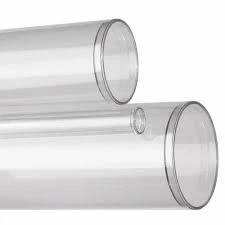Dic . 10, 2024 13:48 Back to list
Understanding the Benefits and Applications of UPVC Pipes in Modern Construction
Understanding UPVC Pipes Advantages and Applications
UPVC, or Unplasticized Polyvinyl Chloride, has emerged as a popular material in various industries, particularly in plumbing and construction. Renowned for its durability and versatility, UPVC pipes are increasingly used for water supply, drainage systems, and even in the agricultural sector. This article delves into the properties, benefits, and applications of UPVC pipes, shedding light on why they have become a preferred choice for many projects.
One of the key features of UPVC pipes is their impressive resistance to corrosion. Unlike traditional metal pipes, which can rust and degrade over time due to exposure to moisture, UPVC pipes are impervious to chemical reactions that lead to corrosion. This characteristic makes UPVC an ideal choice for transporting water and sewage, ensuring the integrity of the piping system over time. In addition, UPVC pipes can handle a wide range of pH levels in liquids, making them suitable for various applications without the risk of deterioration.
.
UPVC pipes also boast a smooth internal surface, which reduces friction and improves the flow of fluids. The smoothness prevents the buildup of deposits and sediment, leading to a more efficient system with less maintenance required over time. As a result, UPVC pipes are less likely to become clogged or obstructed, ensuring a reliable and consistent flow of water, sewage, or other substances.
upvc pipe

Furthermore, UPVC pipes are resistant to ultraviolet (UV) radiation, making them suitable for outdoor applications where they may be exposed to sunlight. This UV resistance ensures that the pipes do not become brittle or lose their structural integrity over time, which is particularly important for projects like irrigation systems or drainage lines that are often installed above ground. This durability extends the lifespan of the pipes, making them a cost-effective solution in the long run.
In terms of environmental impact, UPVC pipes are a more sustainable choice compared to traditional materials. They are recyclable, contributing to reduced waste in landfills. Additionally, the production process for UPVC pipes typically consumes less energy than that of metal pipes, resulting in a lower carbon footprint. This eco-friendly aspect aligns with the growing emphasis on sustainability in construction practices.
UPVC pipes find a wide spectrum of applications across various sectors. In residential settings, they are commonly used for plumbing and drainage systems, ensuring efficient water flow and waste management. In the agricultural sector, UPVC pipes are utilized for irrigation systems due to their resistance to corrosion and UV rays. Moreover, they are employed in industrial applications for chemical processing and waste disposal, where their chemical resistance is particularly advantageous.
In conclusion, UPVC pipes represent a modern solution for numerous piping needs. Their resilience to corrosion, lightweight construction, smooth flow characteristics, UV resistance, and environmental benefits make them a superior choice over traditional materials. As industries continue to innovate and prioritize sustainability, the demand for UPVC pipes is likely to grow, solidifying their place as a staple in construction and plumbing projects worldwide.
-
Durable PP Rigid Sheet: Lightweight, Chemical Resistant Solutions
NewsAug.21,2025
-
PVC Grey Sheet for Extraction: Chemical Resistant & Durable
NewsAug.19,2025
-
Durable PVC Pipe Fittings for Plumbing & Irrigation Needs
NewsAug.18,2025
-
HDPE Steel Belt Reinforced Spiral Corrugated Pipe | High Strength
NewsAug.17,2025
-
HDPE Pipe Fittings: Durable, Leak-Proof Solutions
NewsAug.16,2025
-
Premium CPVC Sheet: High-Temp & Chemical Resistant Solutions
NewsAug.15,2025

